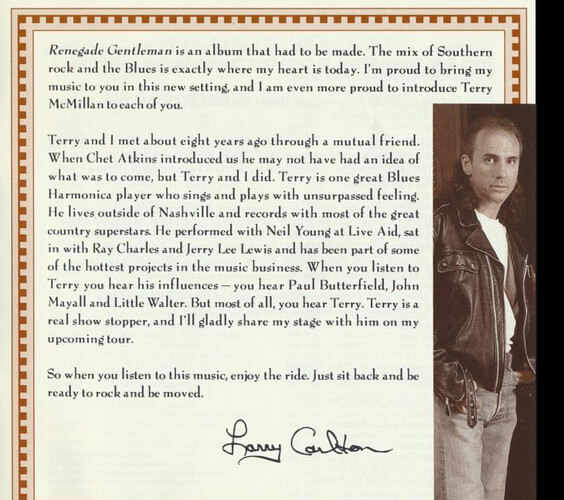I fell into another Terry McMillan rabbit hole again. This time it was ignited by a song that was featured on an episode of Spongebob Squarepants (pls, let me explain). I was looking for who the session harmonica player was on the song “Blazing Trails”, which was featured on Spongebob. And that ended with me searching on the Internet Archive for audio of Terry playing. I stumbled across this message from Larry Carlton on his and Terry’s collaborative album “Renegade Gentlemen”, talking about how they met and even mentioned Terry’s three main influences on the harmonica.
I was told all my life that I needed to listen to Charlie McCoy in order to sound like Terry, but those people were wrong in hindsight with the knowledge that I know now. I always knew that Terry was heavily influenced by the blues, but I know he’s more of a blues player than most country harmonica players after hearing his influences play.
The influence I was most surprised by was John Mayall, who recently was posthumously inducted into the Rock Hall in Cleveland this year, but then I see many people on Facebook who were influenced by his playing too. I was listening to a little bit of John Mayall today, and I’d say that Terry’s chugging style and a lot of his licks were heavily influenced by him. With Paul Butterfield, a lot of people tell me that they hear his influence on Terry and I wholeheartedly agree with them. Especially with the throaty sounding vibrato they both had. And with Little Walter, I feel like some of his technique was rubbed off on Terry, but obviously the latter is a lip purser and the former is a tongue blocker. But I haven’t listened to Little Walter in a hot minute ever since I stopped listening to traditional blues music (mainly because people on Facebook were constantly forcing me to sound like Little Walter and a lot of them would copy the original recording for “Juke” 100k times over with no variation). However, I digress.
Hearing his influences, then listening to Terry’s playing really shows how those subconcious influences I have in my own style. As for myself, I’m mainly influenced by Terry (of course), Jason Ricci, Todd Parrott, and Paul Butterfield. Some people have also heard Sonny Terry in my playing and I can see why they think that. It comes to show how other players have you were influenced by are all connected like that.
